Changes to a pest’s diet could slow the evolution of resistance to biopesticides, according to research from the University of Stirling.
It is hoped that the findings could allow the development of biopesticides that are effective for longer.
Researchers discovered that cotton bollworm moths shows a great deal of genetic variation in how well they survive exposure to biopesticide fungi.
The study showed that exposure to biopesticide fungi might lead to the evolution of resistance, just as with synthetic pesticides. However, alterations to a crop the moth ate had a greater impact on the evolution of resistance than switching the type of pesticide used – meaning that the variety of crop grown could impact how quickly pests adapt to biopesticides.
Scientists from Stirling’s Faculty of Natural Sciences, working with colleagues at the São Paulo State University (Brazil), and the University of Gothenburg (Sweden), tested how well the larvae survived after being exposed to two different fungal pathogens, while feeding on tomato, maize, or soybean plants.
It builds on a study published in 2023 that showed insect pests which attack crops already carry many genes that improve their ability to combat infection, which could lead to resistance to greener pesticides.
Dr Rosie Mangan, post-doctoral researcher at Stirling University said: “Understanding how diet influences fungal biopesticides resistance helps inform smarter pest management strategies that are sustainable and less reliant on chemicals,
“These findings could help to design pest control systems that keep biopesticides effective for longer and reduce environmental damage, especially relevant to agricultural policy in the UK where biopesticide use is growing.”



